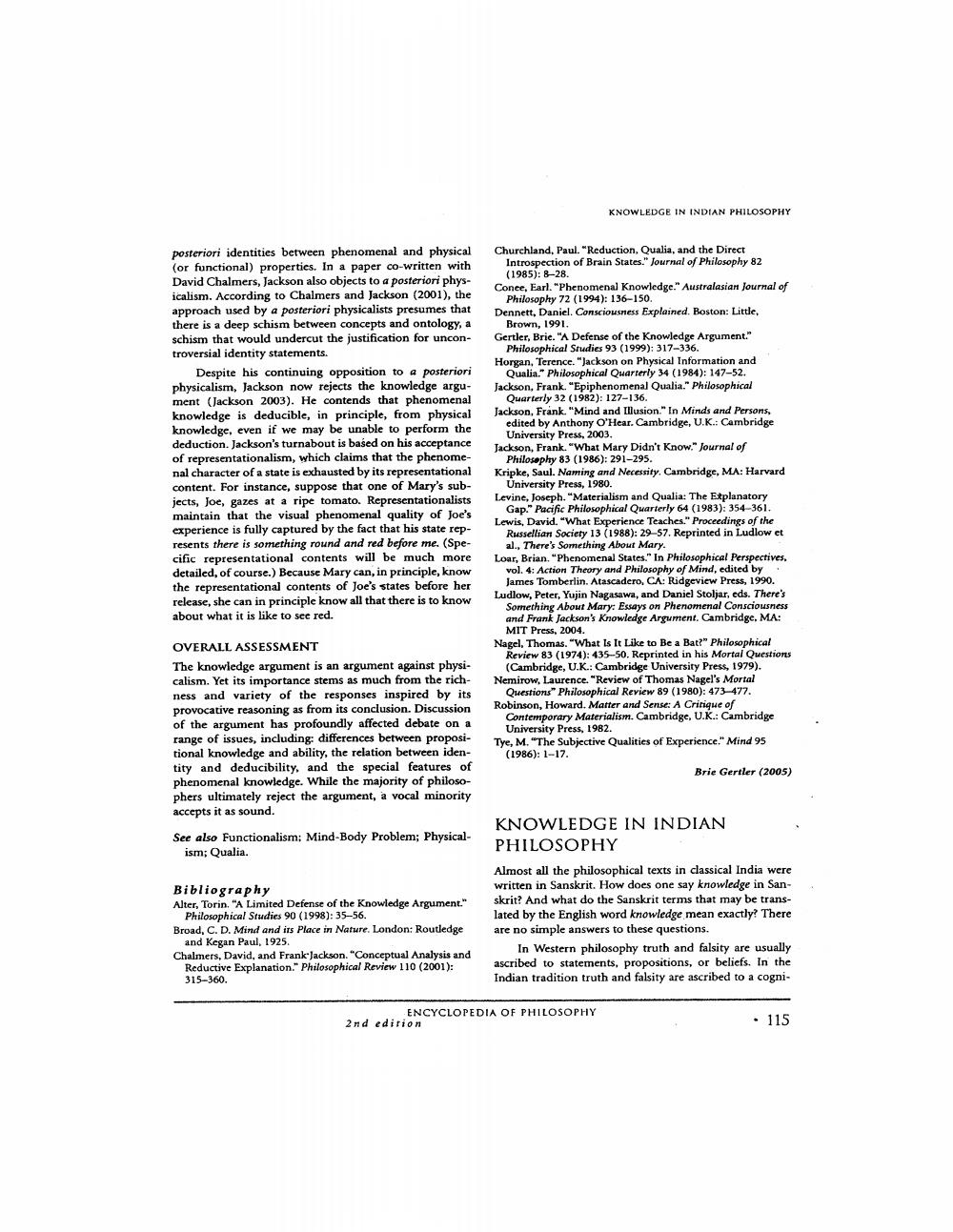Book Title: Knowledge In Indian Philosophy Author(s): Publisher: View full book textPage 1
________________ KNOWLEDGE IN INDIAN PHILOSOPHY posteriori identities between phenomenal and physical (or functional) properties. In a paper co-written with David Chalmers, Jackson also objects to a posteriori physicalism. According to Chalmers and Jackson (2001), the approach used by a posteriori physicalists presumes that there is a deep schism between concepts and ontology, a schism that would undercut the justification for uncontroversial identity statements. Despite his continuing opposition to a posteriori physicalism, Jackson now rejects the knowledge argument (Jackson 2003). He contends that phenomenal knowledge is deducible, in principle, from physical knowledge, even if we may be unable to perform the deduction. Jackson's turnabout is based on his acceptance of representationalism, which claims that the phenomenal character of a state is exhausted by its representational content. For instance, suppose that one of Mary's subjects, Joe, gazes at a ripe tomato. Representationalists maintain that the visual phenomenal quality of Joe's experience is fully captured by the fact that his state represents there is something round and red before me. (Specific representational contents will be much more detailed, of course.) Because Mary can, in principle, know the representational contents of Joe's states before her release, she can in principle know all that there is to know about what it is like to see red. Churchland, Paul. "Reduction, Qualia, and the Direct Introspection of Brain States." Journal of Philosophy 82 (1985): 8-28. Conce, Earl. "Phenomenal Knowledge." Australasian Journal of Philosophy 72 (1994): 136-150. Dennett, Daniel. Consciousness Explained. Boston: Little, Brown, 1991. Gertler, Brie. "A Defense of the knowledge Argument." Philosophical Studies 93 (1999): 317-336. Horgan, Terence. "Jackson on Physical Information and Qualia." Philosophical Quarterly 34 (1984): 147-52. Jackson, Frank. "Epiphenomenal Qualia." Philosophical Quarterly 32 (1982): 127-136. Jackson, Frank. "Mind and Illusion." In Minds and Persons, edited by Anthony O'Hear. Cambridge, U.K.: Cambridge University Press, 2003. Jackson, Frank. "What Mary Didn't Know." Journal of Philosophy 83 (1986): 291-295. Kripke, Saul. Naming and Necessity. Cambridge, MA: Harvard University Press, 1980. Levine, Joseph. "Materialism and Qualia: The Explanatory Gap." Pacific Philosophical Quarterly 64 (1983): 354-361. Lewis, David. "What Experience Teaches." Proceedings of the Russellian Society 13 (1988): 29-57. Reprinted in Ludlow et al., There's Something About Mary. Loar, Brian. "Phenomenal States." In Philosophical Perspectives, vol. 4: Action Theory and Philosophy of Mind, edited by . James Tomberlin. Atascadero, CA: Ridgeview Press, 1990. Ludlow, Peter, Yujin Nagasawa, and Daniel Stoljar, eds. There's Something About Mary: Essays on Phenomenal Consciousness and Frank Jackson's Knowledge Argument. Cambridge, MA: MIT Press, 2004. Nagel, Thomas. "What Is It Like to Be a Bat?" Philosophical Review 83 (1974): 435-50. Reprinted in his Mortal Questions (Cambridge, U.K.: Cambridge University Press, 1979). Nemirow, Laurence. "Review of Thomas Nagel's Mortal Questions" Philosophical Review 89 (1980): 473-477. Robinson, Howard. Matter and Sense: A Critique of Contemporary Materialism. Cambridge, U.K.: Cambridge University Press, 1982. Tye, M. "The Subjective Qualities of Experience." Mind 95 (1986): 1-17. Brie Gertler (2005) OVERALL ASSESSMENT The knowledge argument is an argument against physicalism. Yet its importance stems as much from the richness and variety of the responses inspired by its provocative reasoning as from its conclusion. Discussion of the argument has profoundly affected debate on a range of issues, including: differences between propositional knowledge and ability, the relation between identity and deducibility, and the special features of phenomenal knowledge. While the majority of philosophers ultimately reject the argument, a vocal minority accepts it as sound. See also functionalism; Mind-Body Problem; Physical ism; Qualia. KNOWLEDGE IN INDIAN PHILOSOPHY Bibliography Alter, Torin. "A Limited Defense of the knowledge Argument." Philosophical Studies 90 (1998): 35-56. Broad, C.D. Mind and its Place in Nature. London: Routledge and Kegan Paul, 1925. Chalmers, David, and Frank Jackson. "Conceptual Analysis and Reductive Explanation." Philosophical Review 110 (2001): 315-360. Almost all the philosophical texts in classical India were written in Sanskrit. How does one say knowledge in Sanskrit? And what do the Sanskrit terms that may be translated by the English word knowledge mean exactly? There are no simple answers to these questions. In Western philosophy truth and falsity are usually ascribed to statements, propositions, or beliefs. In the Indian tradition truth and falsity are ascribed to a cogni ENCYCLOPEDIA OF PHILOSOPHY 2nd edition * 115Page Navigation
1 2 3 4 5 6 7 8 9
